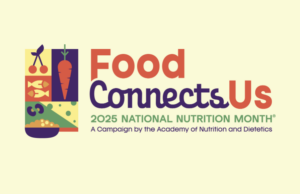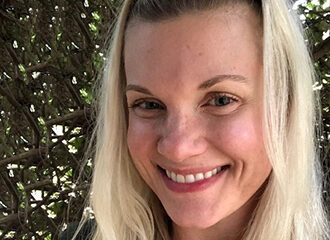Written by: Becky Mehr, MS, RDN, CEDS-S, LDN,
Director of Outpatient Nutrition
National Nutrition Month is time where we explore the critical role nutrition plays in our lives and how those who participate help increase communal wellness—including you.
“Let thy food be thy medicine and medicine thy food” – Hippocrates (400 BC)
National Nutrition Month® is a month-long campaign to spotlight nutrition and the role of the Registered Dietitian in supporting wellness for the community. At Renfrew, Registered Dietitians are a valuable part of your treatment team and can be essential for a successful recovery. Registered Dietitians help to ensure nutritional needs are being met while giving you the tools to challenge misinformation.
The History

The theme for National Nutrition Month ® 2025 is “Food Connects Us”. Food is a connecting factor for many of us. It is also an essential part of daily life so it’s important to explore our relationship with food.
3 Ways Food Connects Us
- Our Culture: Food is an important part of culture. Food is an expression of identity connecting one to their family, history, values and beliefs. Food is a way to embrace your heritage or to become more informed about other cultures. Food also plays a role in festivals and celebrations. Like Diwali, the festival of lights, there are sweets and savory snacks traditional to the celebration that ties one to that culture and identity.
- Family and Friends: Sharing meals with family, friends or strangers is way to build connection. It is through sharing meals that brings a sense of community, support and curiosity. The memories tied to specific foods can bring comfort when sick or loses occur or joy in moments of celebration. Specific or special recipes help to bring connection to one’s history, culture and family.
- Our Bodies: Food connects us to our bodies. Our body is designed to send signs of hunger, fullness, sickness/illness or need for rest, plus other cues. These signals help to connect us to our bodies to be able to care for our body and support ourselves. The body may have cravings for foods when there are nutrient deficiencies or emotions present. Honoring the connection between food and the body can bring about freedom to enjoy a vast variety of foods when there are allergies or other medical conditions – to expand vs limit – through gentle nutrition.
When there is presence of disordered eating or an eating disorder a disconnection can occur within ones’ culture, family and bodies leading to isolation, fear or avoidance. Food is an integral part of daily living, and which makes it so hard to navigate during the recovery process. Exploring the ways food connects us helps to strengthen the relationship between you and your needs, values, and goals.
If by reading this you recognize that you are struggling with your connection to food that aligns with your values, needs and goals seek support from a Registered Dietitian – A Registered Dietitian can assist in helping you connect back to food in an adaptive way bringing you closer to your culture, family and friends and freedom. They will assist in customizing a plan for you and providing education to assist in you having a nutritionally sound future in your recovery process.
Many during this month shift their focus to their health and are looking for resources geared towards the theme “Food Connects Us.” Here are a few resources that can get you started or enhance your recovery journey.
Books To Read
- Salt, Fat, Acid, Heat: Mastering the Elements of Good Cooking by Samin Nosrat and Wendy MacNaughton
- Great book on how cooking methods and seasonings can enhance the flavor of food and incorporate variety.
- The Princess and the Pea by Hans Christian Anderson
- Shows how the body sends signals.
- Intuitive Eating by Evelyn Tribole, MS, RDN, CEDRD-S and Elysa Resch, MS, RDN, CEDRD-S, FAND
- Provides 10 principles intended to help people reject the diet mentality, honor and respect your body’s signals, and ultimately make peace with food.
- Provides 10 principles intended to help people reject the diet mentality, honor and respect your body’s signals, and ultimately make peace with food.
Renfrew-Specific Podcasts
- Episode 38: “Can I eat that?”: Busting Myths with PCOS Expert and Registered Dietitian Nutritionist, Angela Grassi
- Episode 39: “What’s Happening in Health Class?”: Preventing Eating Disorders in the School Setting with Lauren Dorman, RD
- Episode 52: Where’s My Roadmap? Parenting a Child with an Eating Disorder with Jane Reagan, RDN, CEDS-C, MEd
Renfrew-Specific Webinar
Bringing the Joy Back to Food in Eating Disorder Recovery
Date: March 19, 2025
Time: 12pm – 1pm
Presented by: Samantha Wint, MPH, RDN, LDN – Director of Nutrition at The Renfrew Center of Florida
Food plays such a large role in our lives. It nourishes us, offers us pleasure and satisfaction, and can connect us to our culture and to our communities. When navigating an eating disorder or diet culture, we may instead engage in reductive, black-and-white views of food. We may lose that connection and joy, instead focusing on numbers, rules, and deeming ingredients or entire food groups as “bad.”
In honor of National Nutrition Month, this webinar will explore how to reject these mentalities and make progress in recovery by reclaiming joy in food. Participants will learn how food can be a powerful tool for celebration, comfort, and connection.
Videos
References:
- S Denny. (2006). National Nutrition Month: A Brief History. JADA. 106(3): 365-366.
- National Nutrition Month (eatright.org)



